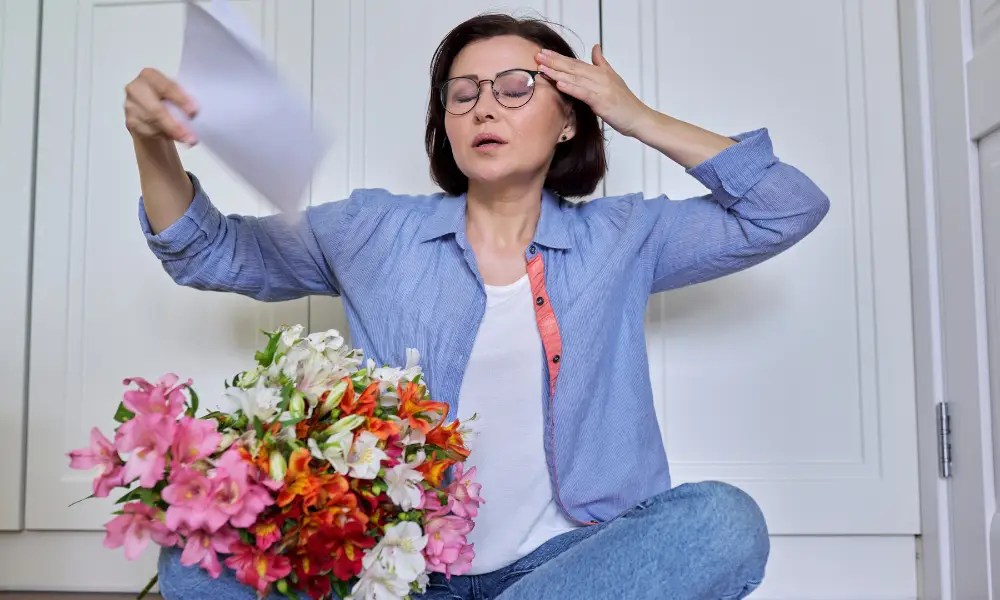Hot flashes, a common symptom experienced by many, can significantly disrupt daily life. These sudden, intense feelings of heat accompanied by rapid heartbeat and perspiration often lead individuals to explore treatment options. While pharmaceutical interventions exist, a growing interest surrounds non-pharmacological approaches, offering a more holistic and personalized route to relief. In this article, we will talk about hot flashes, their causes and how to manage them with the help of non-pharmacological treatment.
Contents
Understanding Hot Flashes 
Hot flashes, also known as hot flushes, are a sudden and intense feeling of warmth, typically accompanied by a flushed or red face and sweating. They are a common symptom experienced by many individuals, especially women, during certain life stages. Hot flashes are often associated with hormonal changes, particularly fluctuations in estrogen levels. Some key points about hot flashes include:
Hot flashes are most commonly associated with menopause, which is the natural biological process that marks the end of a woman’s reproductive years. During menopause, estrogen levels decline, and this hormonal shift is believed to be a major contributing factor to hot flashes.
- Menopausal Hot Flashes
Women approaching or going through menopause may experience hot flashes as a result of the hormonal changes occurring in their bodies. Hot flashes can vary in intensity and frequency. - Perimenopausal Period
Hot flashes can also occur during the perimenopausal period, which is the time leading up to menopause when hormonal fluctuations may already be underway. - Other Causes
While most commonly associated with menopause, hot flashes can also be caused by other factors such as certain medications, medical conditions, and treatments like hormone therapy. - Symptoms
Hot flashes are characterized by a sudden feeling of heat spreading through the upper body, often starting in the face and chest. This sensation can be accompanied by sweating and a rapid heartbeat. Afterward, individuals may experience chills as the body attempts to cool down. - Triggers
Various factors can trigger hot flashes, including stress, spicy foods, caffeine, alcohol, and hot environments. - Duration
Hot flashes can last for a few minutes to several minutes. Some individuals may experience them infrequently, while others may have multiple episodes throughout the day. - Management
Lifestyle modifications, such as wearing layered clothing, maintaining a cool environment, and managing stress, can help alleviate hot flashes.
Conventional Approaches To Manage Hot Flashes
Hot flashes associated with menopause or hormonal changes are typically a symptom rather than a condition that can be “cured” in the traditional sense. Menopausal hot flashes are a natural part of the aging process, and they often subside on their own over time. However, there are ways to manage and alleviate the symptoms. Here are some approaches:
- Hormone Replacement Therapy (HRT)
For women experiencing severe menopausal symptoms, including hot flashes, hormone replacement therapy (HRT) may be recommended. This involves supplementing the body with estrogen or a combination of estrogen and progesterone to address hormonal imbalances. However, the use of HRT has potential risks and benefits, and its suitability should be discussed with a healthcare professional. - Lifestyle Modifications
Simple lifestyle changes can help manage hot flashes. These may include dressing in layers, keeping the room cool, using fans, avoiding triggers like spicy foods or caffeine, and managing stress through relaxation techniques. - Alternative Therapies
Some individuals find relief from hot flashes through alternative therapies such as acupuncture, yoga, or mindfulness meditation. While research on the effectiveness of these approaches varies, some people report positive results. - Prescription Medications
Certain medications, such as selective serotonin reuptake inhibitors (SSRIs) and selective norepinephrine reuptake inhibitors (SNRIs), originally developed for treating depression, have been shown to help reduce the frequency and severity of hot flashes. - Herbal Supplements
Some women explore the use of herbal supplements like black cohosh, evening primrose oil, or soy isoflavones. However, the effectiveness and safety of these supplements can vary, and it’s important to consult with a healthcare professional before using them.
It’s essential to remember that the goal is often symptom management rather than a complete cure. The approach to managing hot flashes varies from person to person, and what works for one individual may not work for another.
Understanding Non-Pharmacological Treatments 
Non-pharmacological treatments encompass a wide range of approaches that don’t involve medication. These methods aim to address the root causes of hot flashes and improve overall well-being.
Non-pharmacological or non-drug treatments for hot flashes focus on lifestyle changes, behavioural strategies, and alternative therapies. While these approaches may not eliminate hot flashes, they can help manage and reduce the frequency and severity of symptoms. Here are some non-pharmacological treatments for hot flashes:
Dress in Layers
Wear lightweight, breathable clothing that can be easily adjusted to help regulate body temperature. This allows you to remove layers during a hot flash and put them back on afterward.
Cooling Techniques
Use fans or air conditioning to cool your environment. Keep a small fan on your desk or bedside table to provide instant relief during a hot flash.
Stay Hydrated
Drink plenty of water throughout the day to stay hydrated. This can help regulate body temperature and reduce the intensity of hot flashes.
Avoid Triggers
Identify and avoid triggers that may worsen hot flashes. Common triggers include spicy foods, caffeine, alcohol, and hot beverages.
Mind-Body Techniques
Practice relaxation techniques such as deep breathing exercises, meditation, and yoga. These methods can help reduce stress and anxiety, which may contribute to the occurrence of hot flashes.
Acupuncture
Some women find relief from hot flashes through acupuncture, an alternative therapy that involves inserting thin needles into specific points on the body. Consult with a qualified acupuncture practitioner to explore this option.
Herbal Supplements
Certain herbal supplements, such as black cohosh, soy isoflavones, and evening primrose oil, have been suggested as potential remedies for hot flashes. However, their effectiveness varies, and it’s essential to consult with a healthcare professional before using any herbal supplements.
Regular Exercise
Engage in regular physical activity, as exercise can help regulate hormones and improve overall well-being. Aim for at least 150 minutes of moderate-intensity exercise per week.
Maintain a Healthy Weight
Achieving and maintaining a healthy weight may help reduce the severity of hot flashes. Weight management can be particularly important for women with obesity, as excess body fat may contribute to hormonal imbalances.
Cooling Bedding
Use cooling bedding materials, such as moisture-wicking sheets and breathable blankets, to promote a comfortable sleeping environment.
It’s important to note that the effectiveness of non-pharmacological treatments can vary from person to person. It’s advisable to consult with a healthcare professional before making significant changes to your lifestyle or trying alternative therapies, especially if you have pre-existing health conditions. Additionally, combining several of these strategies may provide more comprehensive relief.
Conclusion
In conclusion, non-pharmacological treatments for hot flashes provide a holistic and diverse approach to symptom management. From lifestyle changes to alternative medicine practices, individuals have a range of options to explore. Embracing a comprehensive strategy that addresses both the physical and emotional aspects of hot flashes can significantly improve one’s quality of life during this transitional phase.
If you are facing menopause related issues, menopause treatment at HerMantra can help. Book your free trial online menopause treatment session now.




